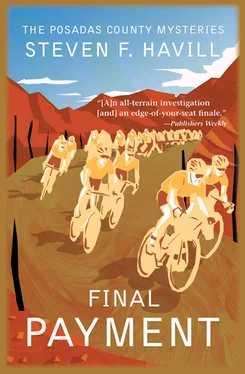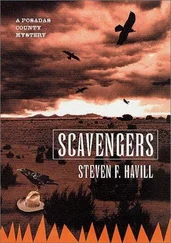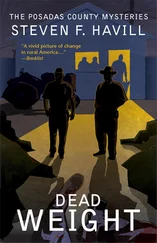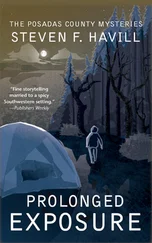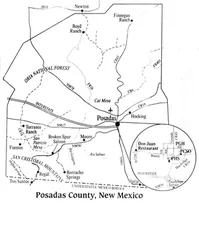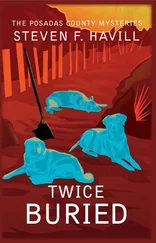Steven Havill - Final Payment
Здесь есть возможность читать онлайн «Steven Havill - Final Payment» весь текст электронной книги совершенно бесплатно (целиком полную версию без сокращений). В некоторых случаях можно слушать аудио, скачать через торрент в формате fb2 и присутствует краткое содержание. Год выпуска: 2011, Издательство: Poisoned Pen Press, Жанр: Полицейский детектив, на английском языке. Описание произведения, (предисловие) а так же отзывы посетителей доступны на портале библиотеки ЛибКат.
- Название:Final Payment
- Автор:
- Издательство:Poisoned Pen Press
- Жанр:
- Год:2011
- ISBN:нет данных
- Рейтинг книги:3 / 5. Голосов: 1
-
Избранное:Добавить в избранное
- Отзывы:
-
Ваша оценка:
- 60
- 1
- 2
- 3
- 4
- 5
Final Payment: краткое содержание, описание и аннотация
Предлагаем к чтению аннотацию, описание, краткое содержание или предисловие (зависит от того, что написал сам автор книги «Final Payment»). Если вы не нашли необходимую информацию о книге — напишите в комментариях, мы постараемся отыскать её.
Final Payment — читать онлайн бесплатно полную книгу (весь текст) целиком
Ниже представлен текст книги, разбитый по страницам. Система сохранения места последней прочитанной страницы, позволяет с удобством читать онлайн бесплатно книгу «Final Payment», без необходимости каждый раз заново искать на чём Вы остановились. Поставьте закладку, и сможете в любой момент перейти на страницу, на которой закончили чтение.
Интервал:
Закладка:
Normally, she would have taken an interest in the audience-scanning the faces, watching the whispered conversations as part of an occupational habit. Now, she watched her son-what she could see of the top of his head, that is-and wondered just how much the seven-year-old understood about what the various adults seated behind him expected of him. Did he know how excited they were?
Onstage, Francisco’s piano teacher, Edith Gracie, conferred with the other instructor with whom she had coordinated the evening’s recital-the high school band director. He shrugged helplessly at something the elderly woman said, and Mrs. Gracie took him by the elbow. The conversation continued at the bass end of the grand piano’s keyboard.
“Maybe they’re missing a chord,” Francis said in a conspiratorial whisper. His arms were locked around their younger son, Carlos, and the little boy’s eyes were huge and watchful.
Estelle grimaced. “When I was a senior here,” she said, “a couple of my classmates sprayed foam insulation in the piano before an assembly. That stuff you can buy in aerosol cans? That same piano, I’m sure. That’s how long it’s been around.”
Francis laughed and with Carlos’ hands in his mimed playing a piano. “Thunk, thunk, thunk. Maybe that’s what we need for this gig. Some insulation.” He nodded at the program. “At least no one is torturing a violin tonight.”
The confab onstage ended with Mrs. Gracie giving a quick, appreciative nod at something her colleague said, and then she walked to the edge of the stage, facing the audience of forty-five people. Estelle glanced at the single-sheet program as the audience hushed. Her son was listed toward the end, followed by Melody Mears and two other more advanced students.
“Good evening,” Mrs. Gracie said solemnly. Her voice was deep and rich, and she smiled affectionately at the row of student musicians for a moment before looking up at the audience. “We have a treat for you tonight, as I’m sure you’ll agree. Mr. Parsons and I are so proud of these young people. Now, some of our musicians are seasoned veterans. Jaycee Sandoval and I were discussing this very thing earlier today, and tonight marks her twentieth recital since she started playing piano when she was five years old. Can you imagine that?” She beamed at the older student sitting toward the end of the row whose name appeared last on the program.
“It would also be appropriate to announce at this time that Jaycee has earned the prestigious Marks Scholarship for musical studies at the University of New Mexico.” Mrs. Gracie waited until the applause had stopped.
“We expect grand things from all of these young musicians. Four of them have not played before an audience prior to tonight, and isn’t that wonderful?” She held out her own program toward the musicians, letting them bask in the moment. “We’ll begin tonight with Toby Escoba, a student of Mr. Parsons. Toby is fourteen, he’s an old hand at performance, and you may recall his beautiful trumpet rendition of Mozart’s ‘Laudate Dominum’ at the Christmas concert last winter. As your program notes, he’ll be playing Wahlberg’s ‘All That Jazz,’ with Mr. Parsons accompanying on the piano.” She turned and patted the Baldwin’s broad flank and then waggled a finger at Parsons, who had settled on the piano bench. “We certainly hope this old thing doesn’t fall to pieces.”
A student with shoulders suited for a linebacker vaulted onto the stage, ignoring the two steps. His trumpet looked fragile in his beefy hands. He took a moment to smooth out his music on the rack, blew silently through the trumpet’s mouthpiece, and fluttered the valves. Mr. Parsons, a large, well-padded man, sat quietly at the piano bench, waiting. Finally, Toby took a deep breath, shook his right hand as if the fingers had gone asleep, and then nodded at his accompanist. A dozen bars of the dissonant music left Estelle wondering how it was possible to distinguish correct notes from strays. The Baldwin held together, the trumpet blasted and screamed, and Toby Escoba beamed when the audience burst into applause twice before he finished.
Through it all, Estelle’s son Francisco remained remarkably quiet, occasionally bouncing half out of his chair, or turning to the girl on his left for another whispered conference.
From Toby’s romping beginning, the recital continued demurely with a simple piano solo played by a beginning student so tiny that her feet swung twelve inches from the stage floor. She played solemnly, brows beetled with concentration, her stiff little fingers robotic. As the concert progressed from student to student, Estelle found herself referring back to the printed program, as the names marched toward her son’s.
When Pitney Clarke was introduced, the tall girl seated beside Francisco rose, and to Estelle’s surprise, so did her son. They made an interesting pair-seven-year-old Francisco darkly handsome in black slacks and shoes and his favorite plum-colored pullover, Pitney tall and graceful in a black skirt and long-sleeved white blouse, frilly around the throat.
Pitney carried a portfolio of music, and she took her time arranging it on the piano. She whispered instructions to Francisco, who apparently had been nominated to be her page turner. He nodded quickly, even impatiently, as if he’d attended to this chore a thousand times. Serenity and ferocity appeared to be Pitney’s favorite emotions as she tackled the long and complex Schubert piece, with many passages sounding as if they required at least a dozen fingers.
The young musician managed Schubert’s intricacies well enough, but to Estelle’s untrained ear, it sounded as if the composer had written one page nicely, then copied it a dozen times, with each copy held at a slightly different angle for variety.
The communication between the two children at the piano was easy and natural. As each set of pages drew to a close, Estelle saw Francisco lean a little so that his shoulder touched Pitney’s side, and at the right moment, Pitney would offer just a hint of a nod. Francisco would reach forward, perilously close to the keys and the young lady’s lap, and snatch the page. At one point, Estelle sensed that her husband was looking at her. She glanced over at him and saw his raised eyebrow. She wound her hand around her husband’s, including Carlos in the process. There were plenty of secrets in Francisco’s little head-apparently Pitney Clarke was one of them.
The Schubert concerto worked toward its conclusion, and after he turned the last page for Pitney, Francisco sat back on the piano bench, frowning darkly, concentrating on the keyboard. Estelle realized that she was holding her breath. Sure enough, the little boy’s hands reached out, fingers soundlessly caressing the bass keys. Pitney’s fingers floated downward through the concerto’s final resolution, but it was Francisco who played the final, complex chord so infinitely pianissimo, so seamless with the girl’s own playing, that it blended perfectly.
And then he was a joyful seven-year-old again, snatching his hands off the keys and bouncing off the piano bench as if springloaded. Pitney, far more demure at fifteen, stood and acknowledged the audience, then turned and held out her hand to Francisco. The two of them left the stage.
“That’s an interesting expression on your face, querida ,” Estelle’s husband whispered.
Chapter Seven
Estelle took a deep breath, listening to the applause.
“Who’s Pitney Clarke, do you know?” her husband asked, tapping the program.
“Her lesson with Mrs. Gracie is right after Francisco’s. Her mom works for New Mexico Cellular.”
“Ah,” Francis said. “Interesting rapport between those two kids.”
Читать дальшеИнтервал:
Закладка:
Похожие книги на «Final Payment»
Представляем Вашему вниманию похожие книги на «Final Payment» списком для выбора. Мы отобрали схожую по названию и смыслу литературу в надежде предоставить читателям больше вариантов отыскать новые, интересные, ещё непрочитанные произведения.
Обсуждение, отзывы о книге «Final Payment» и просто собственные мнения читателей. Оставьте ваши комментарии, напишите, что Вы думаете о произведении, его смысле или главных героях. Укажите что конкретно понравилось, а что нет, и почему Вы так считаете.
